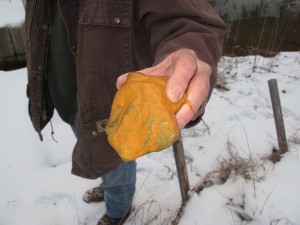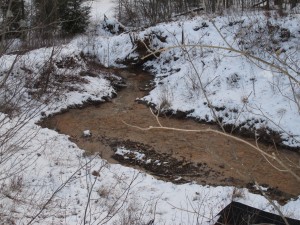Senate bill would encourage use of coal mine water to frack

Susan Phillips / StateImpact Pennsylvania
A rock pulled from the bottom of a creek in Tioga County is covered in orange slime, resulting from iron sulfide in mine water drainage.
A bill that would encourage the use of coal mine water to frack natural gas wells was approved by the Senate Environmental Resources and Energy Committee on Monday. Senate Bill 875 limits potential liabilities for producers who would use the polluted mine water, instead of cleaner fresh water, in the drilling process.
Using acid mine drainage to frack was an idea that had support from the Corbett Administration, as well as the Marcellus Shale Advisory Commission, as a way to reduce the amount of fresh water used by Marcellus Shale developers. But some industry lawyers have said the state’s Clean Streams Law could make producers liable for cleaning up the mine water that they didn’t pollute, in perpetuity. So although some drillers are using acid mine drainage to frack, it hasn’t been an idea that has gotten much traction.
This bill specifically addresses the use of mine water that has been treated by the coal company to standards set by the federal Clean Water Act under the National Pollution Discharge Elimination System. This water typically sits in containment ponds.*
Pennsylvania’s Clean Streams Law was enacted, in part, to prevent a repeat of the coal industry’s devastating impact on water quality. It empowers the Department of Environmental Protection to manage waste water discharge and enforce penalties on industries that pollute. Drillers are worried the Department of Environmental Protection could penalize them for the dirty mine drainage water if they use it to frack a well.
A bill that would have removed fears of liability by amending the state’s environmental Good Samaritan law, was introduced during the last session and passed through committee. But it ran into environmental opposition and never made it any further. That bill addressed the use of untreated acid mine drainage water.
Supporters of using mine water in oil and gas development say it’s a win-win because it would help clean up acid mine water, while reducing fresh water withdrawals. The average natural gas well uses about 4.4 million gallons of water. Senator Camera Bartolotta (R-46), who represents the southwestern corner of the state, is the bill’s sponsor. An aide to Bartolotta says the bill as written was meant to address environmentalists’ concerns.
“Utilizing treated mine water in natural gas operations holds the potential to significantly reduce the withdrawal demands on Pennsylvania’s rivers and streams,” said Bartolotta, in a statement. “Questions regarding liability are the biggest barrier preventing more companies from taking advantage of this environmentally friendly process.”

Susan Phillips / StateImpact Pennsylvania
An orange colored stream flows from an abandoned mine in Tioga County. This tributary to Johnson Creek supports no invertebrate or aquatic life. Seneca Resources has used water from this stream for natural gas production.
Some watershed organizations devoted to cleaning up acid mine drainage have supported the practice, hoping the gas industry could help fund mine water cleanup. But some environmentalists continue to oppose this new bill. They say the mine water would not be treated to drinking water standards, and would therefore pose the same risk from spills and leaks that fracking wastewater does.
“Combining acid mine drainage with fracking waste is the worst of both worlds,” said Myron Arnowitz, with Clean Water Action.
Although the bill would remove the threat of perpetual liability under the Clean Streams Law, it doesn’t let producers completely off the hook in the case of a spill or accident regarding mine water.
But Tracy Carluccio from the Delaware Riverkeeper Network says there are larger environmental issues that have not been addressed.
“We are opposed to any water that doesn’t meet drinking water standards getting injected into the ground,” said Carluccio.
Carluccio is also opposed to using the more polluted acid mine drainage. She says taking mine water out of its watershed is not necessarily a good idea, because it could make it harder for the polluted streams to come back to life.
“It would mean robbing [the acid mine drainage streams] of critical base flow. It will make it more difficult to restore these streams.”
The bill will now move to the full senate for a vote.
*This article has been updated to accurately reflect the intent of the legislation, which is aimed at the use of treated mine water, not untreated acid mine drainage.
















